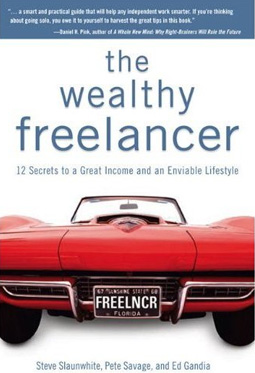 Now that we’re back to business as usual here at Freelancedom, it’s time to focus on the important stuff: Taking our businesses to the next level. Elevating them beyond mere hobbies so that they’re legitimate sources of income. Becoming wealthy freelancers, no matter what wealth means to you.
Now that we’re back to business as usual here at Freelancedom, it’s time to focus on the important stuff: Taking our businesses to the next level. Elevating them beyond mere hobbies so that they’re legitimate sources of income. Becoming wealthy freelancers, no matter what wealth means to you.
I had seen lots of online love for Steve Slaunwhite, Pete Savage, and Ed Gandia’s The Wealthy Freelancer before I broke down and picked up my own copy. Why did I wait so long? Being a raging book nerd, with a particular love for self-help-y career titles, I had started to feel as if none of the books I was reading had anything new to say.
The Wealthy Freelancer exceeded my expectations by… well… a lot. As I mentioned in a related post, the book is so much more than inspirational mumbo jumbo. Rather, it contains concrete tips and step-by-step instructions for making it work.
I’m curious to hear if you loved it as much as I did, and whether or not it had anything new to teach you. Just as with last time, I’d love for you to share your thoughts in the comments section of this post, in addition to your responses to the following questions:
1. The authors of this book assert that you can improve your business drastically even if you implement just a handful of the tips in this book. Which tips spoke to you the most, and why?
2. The first chapter of The Wealthy Freelancer (TWF) discusses what being a wealthy freelancer really means, and then challenges readers to explore what wealth means to them, and to write out their ideal day. What does wealth mean to you, and how close are you to really living your ideal day?
3. TWF touts the power of the buzz piece, and lays out what your buzz piece could possibly entail. Have you already created and launched your buzz piece? If so, how did it boost your sales. If not, let’s have a brainstorming party. What types of buzz pieces could benefit your business?
4. Secret 8 of TWF delves into the importance of focus, something I’ve struggled with myself. At times, I’ve tried to do too much, and I’ve had to take care to be sure that everything I was attempting was connected, and easy to convey to others. Do you have trouble answering the question What do you do? Is it time to start cutting items from your list of offerings? Are you trying to be indispensable to everyone? Assignment: Take a good, hard look at what you’re trying to do, and determine where you can trim the fat. Share the results in the comments below.Â
5. For me, wealth means being able to pay the bills without having a panic attack every month. It means being able to work at a leisurely pace, and still have time for things like yoga, and Netflix, and lunch. It means being able to prioritize my health instead of burning myself out with an around-the-clock work schedule. The authors of TWF seem to agree that “a wealthy freelancer is a healthy freelancer.” What has kept you from achieving a healthy work-life balance? Which tips from Secret 10 (pages 191 – 194) could you implement now without freaking the eff out?
And finally, what else from TWF leapt out at you? What inspired you? What have you implemented already, and how has it worked for you?

